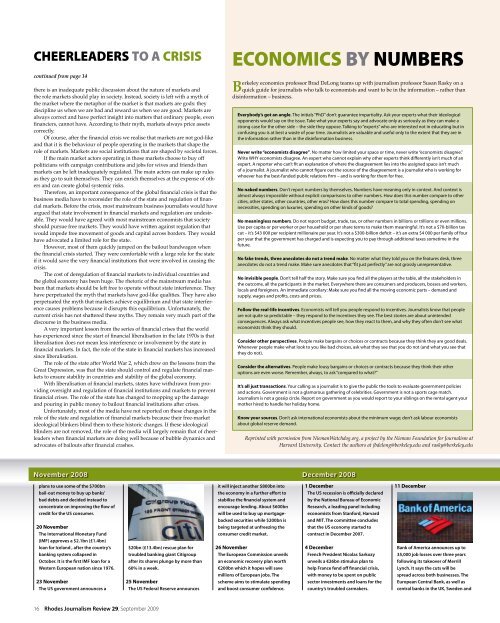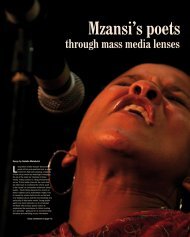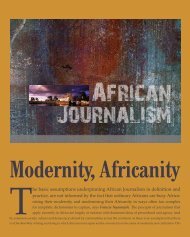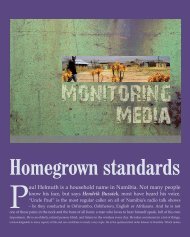Riding on the cup: - Rhodes Journalism Review - Rhodes University
Riding on the cup: - Rhodes Journalism Review - Rhodes University
Riding on the cup: - Rhodes Journalism Review - Rhodes University
Create successful ePaper yourself
Turn your PDF publications into a flip-book with our unique Google optimized e-Paper software.
cheerleaders To a crisis<br />
c<strong>on</strong>tinued from page 14<br />
<strong>the</strong>re is an inadequate public discussi<strong>on</strong> about <strong>the</strong> nature of markets and<br />
<strong>the</strong> role markets should play in society. Instead, society is left with a myth of<br />
<strong>the</strong> market where <strong>the</strong> metaphor of <strong>the</strong> market is that markets are gods: <strong>the</strong>y<br />
discipline us when we are bad and reward us when we are good. Markets are<br />
always correct and have perfect insight into matters that ordinary people, even<br />
financiers, cannot have. According to <strong>the</strong>ir myth, markets always price assets<br />
correctly.<br />
Of course, after <strong>the</strong> financial crisis we realise that markets are not god-like<br />
and that it is <strong>the</strong> behaviour of people operating in <strong>the</strong> markets that shape <strong>the</strong><br />
role of markets. Markets are social instituti<strong>on</strong>s that are shaped by societal forces.<br />
If <strong>the</strong> main market actors operating in those markets choose to buy off<br />
politicians with campaign c<strong>on</strong>tributi<strong>on</strong>s and jobs for wives and friends <strong>the</strong>n<br />
markets can be left inadequately regulated. The main actors can make up rules<br />
as <strong>the</strong>y go to suit <strong>the</strong>mselves. They can enrich <strong>the</strong>mselves at <strong>the</strong> expense of o<strong>the</strong>rs<br />
and can create global systemic risks.<br />
Therefore, an important c<strong>on</strong>sequence of <strong>the</strong> global financial crisis is that <strong>the</strong><br />
business media have to rec<strong>on</strong>sider <strong>the</strong> role of <strong>the</strong> state and regulati<strong>on</strong> of financial<br />
markets. Before <strong>the</strong> crisis, most mainstream business journalists would have<br />
argued that state involvement in financial markets and regulati<strong>on</strong> are undesirable.<br />
They would have agreed with most mainstream ec<strong>on</strong>omists that society<br />
should pursue free markets. They would have written against regulati<strong>on</strong> that<br />
would impede free movement of goods and capital across borders. They would<br />
have advocated a limited role for <strong>the</strong> state.<br />
However, most of <strong>the</strong>m quickly jumped <strong>on</strong> <strong>the</strong> bailout bandwag<strong>on</strong> when<br />
<strong>the</strong> financial crisis started. They were comfortable with a large role for <strong>the</strong> state<br />
if it would save <strong>the</strong> very financial instituti<strong>on</strong>s that were involved in causing <strong>the</strong><br />
crisis.<br />
The cost of deregulati<strong>on</strong> of financial markets to individual countries and<br />
<strong>the</strong> global ec<strong>on</strong>omy has been huge. The rhetoric of <strong>the</strong> mainstream media has<br />
been that markets should be left free to operate without state interference. They<br />
have perpetuated <strong>the</strong> myth that markets have god-like qualities. They have also<br />
perpetuated <strong>the</strong> myth that markets achieve equilibrium and that state interference<br />
causes problems because it disrupts this equilibrium. Unfortunately, <strong>the</strong><br />
current crisis has not shattered <strong>the</strong>se myths. They remain very much part of <strong>the</strong><br />
discourse in <strong>the</strong> business media.<br />
A very important less<strong>on</strong> from <strong>the</strong> series of financial crises that <strong>the</strong> world<br />
has experienced since <strong>the</strong> start of financial liberalisati<strong>on</strong> in <strong>the</strong> late 1970s is that<br />
liberalisati<strong>on</strong> does not mean less interference or involvement by <strong>the</strong> state in<br />
financial markets. In fact, <strong>the</strong> role of <strong>the</strong> state in financial markets has increased<br />
since liberalisati<strong>on</strong>.<br />
The role of <strong>the</strong> state after World War 2, which drew <strong>on</strong> <strong>the</strong> less<strong>on</strong>s from <strong>the</strong><br />
Great Depressi<strong>on</strong>, was that <strong>the</strong> state should c<strong>on</strong>trol and regulate financial markets<br />
to ensure stability in countries and stability of <strong>the</strong> global ec<strong>on</strong>omy.<br />
With liberalisati<strong>on</strong> of financial markets, states have withdrawn from providing<br />
oversight and regulati<strong>on</strong> of financial instituti<strong>on</strong>s and markets to prevent<br />
financial crises. The role of <strong>the</strong> state has changed to mopping up <strong>the</strong> damage<br />
and pouring in public m<strong>on</strong>ey to bailout financial instituti<strong>on</strong>s after crises.<br />
Unfortunately, most of <strong>the</strong> media have not reported <strong>on</strong> <strong>the</strong>se changes in <strong>the</strong><br />
role of <strong>the</strong> state and regulati<strong>on</strong> of financial markets because <strong>the</strong>ir free-market<br />
ideological blinkers blind <strong>the</strong>m to <strong>the</strong>se historic changes. If <strong>the</strong>se ideological<br />
blinders are not removed, <strong>the</strong> role of <strong>the</strong> media will largely remain that of cheerleaders<br />
when financial markets are doing well because of bubble dynamics and<br />
advocates of bailouts after financial crashes.<br />
November 2008<br />
plans to use some of <strong>the</strong> $700bn<br />
bail-out m<strong>on</strong>ey to buy up banks’<br />
bad debts and decided instead to<br />
c<strong>on</strong>centrate <strong>on</strong> improving <strong>the</strong> flow of<br />
credit for <strong>the</strong> US c<strong>on</strong>sumer.<br />
20 november<br />
The Internati<strong>on</strong>al m<strong>on</strong>etary Fund<br />
(ImF) approves a $2.1bn (£1.4bn)<br />
loan for Iceland , after <strong>the</strong> country’s<br />
banking system collapsed in<br />
October. It is <strong>the</strong> first ImF loan for a<br />
Western European nati<strong>on</strong> since 1976.<br />
23 november<br />
The US government announces a<br />
16 <strong>Rhodes</strong> <strong>Journalism</strong> <strong>Review</strong> 29, september 2009<br />
$20bn (£13.4bn) rescue plan for<br />
troubled banking giant Citigroup<br />
after its shares plunge by more than<br />
60% in a week.<br />
25 november<br />
The US Federal Reserve announces<br />
ec<strong>on</strong>omics by nUmbers<br />
Berkeley ec<strong>on</strong>omics professor Brad DeL<strong>on</strong>g teams up with journalism professor Susan Rasky <strong>on</strong> a<br />
quick guide for journalists who talk to ec<strong>on</strong>omists and want to be in <strong>the</strong> informati<strong>on</strong> – ra<strong>the</strong>r than<br />
disinformati<strong>on</strong> – business.<br />
everybody’s got an angle. The initials “PhD” d<strong>on</strong>’t guarantee impartiality. Ask your experts what <strong>the</strong>ir ideological<br />
opp<strong>on</strong>ents would say <strong>on</strong> <strong>the</strong> issue. Take what your experts say and advocate <strong>on</strong>ly as seriously as <strong>the</strong>y can make a<br />
str<strong>on</strong>g case for <strong>the</strong> o<strong>the</strong>r side – <strong>the</strong> side <strong>the</strong>y oppose. Talking to “experts” who are interested not in educating but in<br />
c<strong>on</strong>fusing you is at best a waste of your time. Journalists are valuable and useful <strong>on</strong>ly to <strong>the</strong> extent that <strong>the</strong>y are in<br />
<strong>the</strong> informati<strong>on</strong> ra<strong>the</strong>r than in <strong>the</strong> disinformati<strong>on</strong> business.<br />
never write “ec<strong>on</strong>omists disagree”. No matter how limited your space or time, never write “ec<strong>on</strong>omists disagree.”<br />
Write WHY ec<strong>on</strong>omists disagree. An expert who cannot explain why o<strong>the</strong>r experts think differently isn’t much of an<br />
expert. A reporter who can’t fit an explanati<strong>on</strong> of where <strong>the</strong> disagreement lies into <strong>the</strong> assigned space isn’t much<br />
of a journalist. A journalist who cannot figure out <strong>the</strong> source of <strong>the</strong> disagreement is a journalist who is working for<br />
whoever has <strong>the</strong> best-funded public relati<strong>on</strong>s firm – and is working for <strong>the</strong>m for free.<br />
no naked numbers. D<strong>on</strong>’t report numbers by <strong>the</strong>mselves. Numbers have meaning <strong>on</strong>ly in c<strong>on</strong>text. And c<strong>on</strong>text is<br />
almost always impossible without explicit comparis<strong>on</strong>s to o<strong>the</strong>r numbers. How does this number compare to o<strong>the</strong>r<br />
cities, o<strong>the</strong>r states, o<strong>the</strong>r countries, o<strong>the</strong>r eras? How does this number compare to total spending, spending <strong>on</strong><br />
necessities, spending <strong>on</strong> luxuries, spending <strong>on</strong> o<strong>the</strong>r kinds of goods?<br />
no meaningless numbers. Do not report budget, trade, tax, or o<strong>the</strong>r numbers in billi<strong>on</strong>s or trilli<strong>on</strong>s or even milli<strong>on</strong>s.<br />
Use per capita or per worker or per household or per share terms to make <strong>the</strong>m meaningful. It’s not a $70-billi<strong>on</strong> tax<br />
cut – it’s $43 000 per recipient milli<strong>on</strong>aire per year. It’s not a $300-billi<strong>on</strong> deficit – it’s an extra $4 000 per family of four<br />
per year that <strong>the</strong> government has charged and is expecting you to pay through additi<strong>on</strong>al taxes sometime in <strong>the</strong><br />
future.<br />
no fake trends, three anecdotes do not a trend make. No matter what <strong>the</strong>y told you <strong>on</strong> <strong>the</strong> features desk, three<br />
anecdotes do not a trend make. Make sure anecdotes that “fit just perfectly” are not grossly unrepresentative.<br />
no invisible people. D<strong>on</strong>’t tell half <strong>the</strong> story. Make sure you find all <strong>the</strong> players at <strong>the</strong> table, all <strong>the</strong> stakeholders in<br />
<strong>the</strong> outcome, all <strong>the</strong> participants in <strong>the</strong> market. Everywhere <strong>the</strong>re are c<strong>on</strong>sumers and producers, bosses and workers,<br />
locals and foreigners. An immediate corollary: Make sure you find all <strong>the</strong> moving ec<strong>on</strong>omic parts – demand and<br />
supply, wages and profits, costs and prices.<br />
follow <strong>the</strong> real-life incentives. Ec<strong>on</strong>omists will tell you people resp<strong>on</strong>d to incentives. Journalists know that people<br />
are not quite so predictable – <strong>the</strong>y resp<strong>on</strong>d to <strong>the</strong> incentives <strong>the</strong>y see. The best stories are about unintended<br />
c<strong>on</strong>sequences. Always ask what incentives people see, how <strong>the</strong>y react to <strong>the</strong>m, and why <strong>the</strong>y often d<strong>on</strong>’t see what<br />
ec<strong>on</strong>omists think <strong>the</strong>y should.<br />
C<strong>on</strong>sider o<strong>the</strong>r perspectives. People make bargains or choices or c<strong>on</strong>tracts because <strong>the</strong>y think <strong>the</strong>y are good deals.<br />
Whenever people make what look to you like bad choices, ask what <strong>the</strong>y see that you do not (and what you see that<br />
<strong>the</strong>y do not).<br />
C<strong>on</strong>sider <strong>the</strong> alternatives. People make lousy bargains or choices or c<strong>on</strong>tracts because <strong>the</strong>y think <strong>the</strong>ir o<strong>the</strong>r<br />
opti<strong>on</strong>s are even worse. Remember, always, to ask “compared to what?”<br />
it’s all just transacti<strong>on</strong>s. Your calling as a journalist is to give <strong>the</strong> public <strong>the</strong> tools to evaluate government policies<br />
and acti<strong>on</strong>s. Government is not a glamorous ga<strong>the</strong>ring of celebrities. Government is not a sports cage match.<br />
<strong>Journalism</strong> is not a gossip circle. Report <strong>on</strong> government as you would report to your siblings <strong>on</strong> <strong>the</strong> rental agent your<br />
mo<strong>the</strong>r hired to handle her holiday home.<br />
know your sources. D<strong>on</strong>’t ask internati<strong>on</strong>al ec<strong>on</strong>omists about <strong>the</strong> minimum wage; d<strong>on</strong>’t ask labour ec<strong>on</strong>omists<br />
about global reserve demand.<br />
Reprinted with permissi<strong>on</strong> from NiemanWatchdog.org, a project by <strong>the</strong> Nieman Foundati<strong>on</strong> for <strong>Journalism</strong> at<br />
Harvard <strong>University</strong>. C<strong>on</strong>tact <strong>the</strong> authors at jbdel<strong>on</strong>g@berkeley.edu and rasky@berkeley.edu<br />
it will inject ano<strong>the</strong>r $800bn into<br />
<strong>the</strong> ec<strong>on</strong>omy in a fur<strong>the</strong>r effort to<br />
stabilise <strong>the</strong> financial system and<br />
encourage lending. About $600bn<br />
will be used to buy up mortgagebacked<br />
securities while $200bn is<br />
being targeted at unfreezing <strong>the</strong><br />
c<strong>on</strong>sumer credit market.<br />
26 november<br />
The European Commissi<strong>on</strong> unveils<br />
an ec<strong>on</strong>omic recovery plan worth<br />
€200bn which it hopes will save<br />
milli<strong>on</strong>s of European jobs. The<br />
scheme aims to stimulate spending<br />
and boost c<strong>on</strong>sumer c<strong>on</strong>fidence.<br />
December 2008<br />
1 december<br />
The US recessi<strong>on</strong> is officially declared<br />
by <strong>the</strong> Nati<strong>on</strong>al Bureau of Ec<strong>on</strong>omic<br />
Research, a leading panel including<br />
ec<strong>on</strong>omists from Stanford, Harvard<br />
and mIT. The committee c<strong>on</strong>cludes<br />
that <strong>the</strong> US ec<strong>on</strong>omy started to<br />
c<strong>on</strong>tract in December 2007.<br />
4 december<br />
French President Nicolas Sarkozy<br />
unveils a €26bn stimulus plan to<br />
help France fend off financial crisis,<br />
with m<strong>on</strong>ey to be spent <strong>on</strong> public<br />
sector investments and loans for <strong>the</strong><br />
country’s troubled carmakers.<br />
11 december<br />
Bank of America announces up to<br />
35,000 job losses over three years<br />
following its takeover of merrill<br />
lynch. It says <strong>the</strong> cuts will be<br />
spread across both businesses. The<br />
European Central Bank, as well as<br />
central banks in <strong>the</strong> Uk, Sweden and








